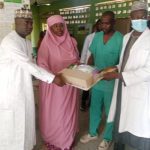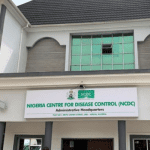Nigeria’s centre for disease control says over 82 percent of confirmed diphtheria cases across affected states are from unimmunized persons.
This is now encouraging more immunization across those areas by health authorities led by the national primary health care development agency.
This was disclosed at the launch of the media epidemiology, infodemic management and social and behaviour change risk communication fellowship, to help guide media practitioners on strengthening its capacity through effective science communication and reporting.
The alarming levels of increasing misinformation, unpredictable attitudes and behaviours during outbreaks and the pandemic, has left some lessons to be learnt on the need for proper information gathering by the media.
This recent outbreak of diphtheria across some states is one public health issue that is now bringing to light cautious steps to take towards also effectively reporting it.
The Nigeria centre for disease control highlights the reasons why the country is getting pockets of outbreaks in some states.
The disease control agency, alongside other health focused organisations, is also launching a media fellowship to reduce the gaps that have been recognised in reporting the epidemiology of diseases.
The media Epidemiology, infodemic management and social behaviour change risk communication, will help to train media professionals in Nigeria.
This in turn will strengthen Nigeria’s capacity to prevent, detect and respond to health events through effective science communication, understanding of risk communication and coordinating management of misinformation.
The media is tasked to ensure that it keeps the population up to date on the changing dynamics of disease and their implications for public health and safety.
The NCDC and other partners believe that this move will really improve strategic approaches in leading preparedness, detection and response on public health emergencies and future pandemics.
Nigeria’s centre for disease control says over 82 percent of confirmed diphtheria cases across affected states are from unimmunized persons.
This is now encouraging more immunization across those areas by health authorities led by the national primary health care development agency.
This was disclosed at the launch of the media epidemiology, infodemic management and social and behaviour change risk communication fellowship, to help guide media practitioners on strengthening its capacity through effective science communication and reporting.
The alarming levels of increasing misinformation, unpredictable attitudes and behaviours during outbreaks and the pandemic, has left some lessons to be learnt on the need for proper information gathering by the media.
This recent outbreak of diphtheria across some states is one public health issue that is now bringing to light cautious steps to take towards also effectively reporting it.
The Nigeria centre for disease control highlights the reasons why the country is getting pockets of outbreaks in some states.
The disease control agency, alongside other health focused organisations, is also launching a media fellowship to reduce the gaps that have been recognised in reporting the epidemiology of diseases.
The media Epidemiology, infodemic management and social behaviour change risk communication, will help to train media professionals in Nigeria.
This in turn will strengthen Nigeria’s capacity to prevent, detect and respond to health events through effective science communication, understanding of risk communication and coordinating management of misinformation.
The media is tasked to ensure that it keeps the population up to date on the changing dynamics of disease and their implications for public health and safety.
The NCDC and other partners believe that this move will really improve strategic approaches in leading preparedness, detection and response on public health emergencies and future pandemics.
Nigeria’s centre for disease control says over 82 percent of confirmed diphtheria cases across affected states are from unimmunized persons.
This is now encouraging more immunization across those areas by health authorities led by the national primary health care development agency.
This was disclosed at the launch of the media epidemiology, infodemic management and social and behaviour change risk communication fellowship, to help guide media practitioners on strengthening its capacity through effective science communication and reporting.
The alarming levels of increasing misinformation, unpredictable attitudes and behaviours during outbreaks and the pandemic, has left some lessons to be learnt on the need for proper information gathering by the media.
This recent outbreak of diphtheria across some states is one public health issue that is now bringing to light cautious steps to take towards also effectively reporting it.
The Nigeria centre for disease control highlights the reasons why the country is getting pockets of outbreaks in some states.
The disease control agency, alongside other health focused organisations, is also launching a media fellowship to reduce the gaps that have been recognised in reporting the epidemiology of diseases.
The media Epidemiology, infodemic management and social behaviour change risk communication, will help to train media professionals in Nigeria.
This in turn will strengthen Nigeria’s capacity to prevent, detect and respond to health events through effective science communication, understanding of risk communication and coordinating management of misinformation.
The media is tasked to ensure that it keeps the population up to date on the changing dynamics of disease and their implications for public health and safety.
The NCDC and other partners believe that this move will really improve strategic approaches in leading preparedness, detection and response on public health emergencies and future pandemics.
Nigeria’s centre for disease control says over 82 percent of confirmed diphtheria cases across affected states are from unimmunized persons.
This is now encouraging more immunization across those areas by health authorities led by the national primary health care development agency.
This was disclosed at the launch of the media epidemiology, infodemic management and social and behaviour change risk communication fellowship, to help guide media practitioners on strengthening its capacity through effective science communication and reporting.
The alarming levels of increasing misinformation, unpredictable attitudes and behaviours during outbreaks and the pandemic, has left some lessons to be learnt on the need for proper information gathering by the media.
This recent outbreak of diphtheria across some states is one public health issue that is now bringing to light cautious steps to take towards also effectively reporting it.
The Nigeria centre for disease control highlights the reasons why the country is getting pockets of outbreaks in some states.
The disease control agency, alongside other health focused organisations, is also launching a media fellowship to reduce the gaps that have been recognised in reporting the epidemiology of diseases.
The media Epidemiology, infodemic management and social behaviour change risk communication, will help to train media professionals in Nigeria.
This in turn will strengthen Nigeria’s capacity to prevent, detect and respond to health events through effective science communication, understanding of risk communication and coordinating management of misinformation.
The media is tasked to ensure that it keeps the population up to date on the changing dynamics of disease and their implications for public health and safety.
The NCDC and other partners believe that this move will really improve strategic approaches in leading preparedness, detection and response on public health emergencies and future pandemics.
Nigeria’s centre for disease control says over 82 percent of confirmed diphtheria cases across affected states are from unimmunized persons.
This is now encouraging more immunization across those areas by health authorities led by the national primary health care development agency.
This was disclosed at the launch of the media epidemiology, infodemic management and social and behaviour change risk communication fellowship, to help guide media practitioners on strengthening its capacity through effective science communication and reporting.
The alarming levels of increasing misinformation, unpredictable attitudes and behaviours during outbreaks and the pandemic, has left some lessons to be learnt on the need for proper information gathering by the media.
This recent outbreak of diphtheria across some states is one public health issue that is now bringing to light cautious steps to take towards also effectively reporting it.
The Nigeria centre for disease control highlights the reasons why the country is getting pockets of outbreaks in some states.
The disease control agency, alongside other health focused organisations, is also launching a media fellowship to reduce the gaps that have been recognised in reporting the epidemiology of diseases.
The media Epidemiology, infodemic management and social behaviour change risk communication, will help to train media professionals in Nigeria.
This in turn will strengthen Nigeria’s capacity to prevent, detect and respond to health events through effective science communication, understanding of risk communication and coordinating management of misinformation.
The media is tasked to ensure that it keeps the population up to date on the changing dynamics of disease and their implications for public health and safety.
The NCDC and other partners believe that this move will really improve strategic approaches in leading preparedness, detection and response on public health emergencies and future pandemics.
Nigeria’s centre for disease control says over 82 percent of confirmed diphtheria cases across affected states are from unimmunized persons.
This is now encouraging more immunization across those areas by health authorities led by the national primary health care development agency.
This was disclosed at the launch of the media epidemiology, infodemic management and social and behaviour change risk communication fellowship, to help guide media practitioners on strengthening its capacity through effective science communication and reporting.
The alarming levels of increasing misinformation, unpredictable attitudes and behaviours during outbreaks and the pandemic, has left some lessons to be learnt on the need for proper information gathering by the media.
This recent outbreak of diphtheria across some states is one public health issue that is now bringing to light cautious steps to take towards also effectively reporting it.
The Nigeria centre for disease control highlights the reasons why the country is getting pockets of outbreaks in some states.
The disease control agency, alongside other health focused organisations, is also launching a media fellowship to reduce the gaps that have been recognised in reporting the epidemiology of diseases.
The media Epidemiology, infodemic management and social behaviour change risk communication, will help to train media professionals in Nigeria.
This in turn will strengthen Nigeria’s capacity to prevent, detect and respond to health events through effective science communication, understanding of risk communication and coordinating management of misinformation.
The media is tasked to ensure that it keeps the population up to date on the changing dynamics of disease and their implications for public health and safety.
The NCDC and other partners believe that this move will really improve strategic approaches in leading preparedness, detection and response on public health emergencies and future pandemics.
Nigeria’s centre for disease control says over 82 percent of confirmed diphtheria cases across affected states are from unimmunized persons.
This is now encouraging more immunization across those areas by health authorities led by the national primary health care development agency.
This was disclosed at the launch of the media epidemiology, infodemic management and social and behaviour change risk communication fellowship, to help guide media practitioners on strengthening its capacity through effective science communication and reporting.
The alarming levels of increasing misinformation, unpredictable attitudes and behaviours during outbreaks and the pandemic, has left some lessons to be learnt on the need for proper information gathering by the media.
This recent outbreak of diphtheria across some states is one public health issue that is now bringing to light cautious steps to take towards also effectively reporting it.
The Nigeria centre for disease control highlights the reasons why the country is getting pockets of outbreaks in some states.
The disease control agency, alongside other health focused organisations, is also launching a media fellowship to reduce the gaps that have been recognised in reporting the epidemiology of diseases.
The media Epidemiology, infodemic management and social behaviour change risk communication, will help to train media professionals in Nigeria.
This in turn will strengthen Nigeria’s capacity to prevent, detect and respond to health events through effective science communication, understanding of risk communication and coordinating management of misinformation.
The media is tasked to ensure that it keeps the population up to date on the changing dynamics of disease and their implications for public health and safety.
The NCDC and other partners believe that this move will really improve strategic approaches in leading preparedness, detection and response on public health emergencies and future pandemics.
Nigeria’s centre for disease control says over 82 percent of confirmed diphtheria cases across affected states are from unimmunized persons.
This is now encouraging more immunization across those areas by health authorities led by the national primary health care development agency.
This was disclosed at the launch of the media epidemiology, infodemic management and social and behaviour change risk communication fellowship, to help guide media practitioners on strengthening its capacity through effective science communication and reporting.
The alarming levels of increasing misinformation, unpredictable attitudes and behaviours during outbreaks and the pandemic, has left some lessons to be learnt on the need for proper information gathering by the media.
This recent outbreak of diphtheria across some states is one public health issue that is now bringing to light cautious steps to take towards also effectively reporting it.
The Nigeria centre for disease control highlights the reasons why the country is getting pockets of outbreaks in some states.
The disease control agency, alongside other health focused organisations, is also launching a media fellowship to reduce the gaps that have been recognised in reporting the epidemiology of diseases.
The media Epidemiology, infodemic management and social behaviour change risk communication, will help to train media professionals in Nigeria.
This in turn will strengthen Nigeria’s capacity to prevent, detect and respond to health events through effective science communication, understanding of risk communication and coordinating management of misinformation.
The media is tasked to ensure that it keeps the population up to date on the changing dynamics of disease and their implications for public health and safety.
The NCDC and other partners believe that this move will really improve strategic approaches in leading preparedness, detection and response on public health emergencies and future pandemics.














